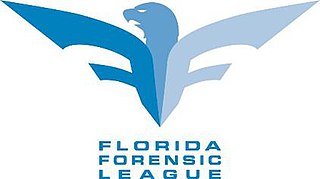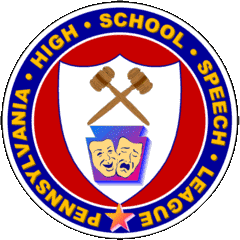
The National Speech and Debate Association (NSDA) is the largest interscholastic speech and debate organization serving middle school and high school students in the United States. It was formed as the National Forensic League in 1925 by Bruno Ernst Jacob.

Debate is a process that involves formal discourse, discussion, and oral addresses on a particular topic or collection of topics, often with a moderator and an audience. In a debate, arguments are put forward for opposing viewpoints. Historically, debates have occurred in public meetings, academic institutions, debate halls, coffeehouses, competitions, and legislative assemblies. Debates have also been conducted for educational and recreational purposes, usually associated with educational establishments and debating societies. These debates emphasize logical consistency, factual accuracy, and emotional appeal to an audience. Modern competitive debate also includes rules for participants to discuss and decide upon the framework of the debate.

The Ohio High School Speech League (OHSSL) is the body that organizes high school forensic competition in the state of Ohio. The OHSSL provides all of the National Forensic League events, but also provides several other events including Declamation. In the 2001-2002 season, Impromptu Speaking was added as an experimental event. The following year Impromptu was made an official OHSSL event. Following the 2013-2014 season, Impromptu was removed as an OHSSL event. OHSSL also offers many other common events such as debate and IE events such as International and United States Extemporaneous Speaking, Duo Interpretation, Dramatic Interpretation, Humorous Interpretation, Program Oral Interpretation, and Original Oratory. Each of the state districts takes part in a district tournament, called "Littles", where a set number of people can move on to compete in the State Championship.
Dramatic Interpretation is an event in National Speech and Debate Association high school forensics competitions. In the National Christian Forensics and Communications Association and the National Catholic Forensic League, the event is combined with Humorous Interpretation to create the Dramatic Performance event. It consists of a piece from any published work, edited to fit within a 10-minute span with a 30-second grace period.

The National Catholic Forensic League (NCFL) is a speech and debate league that was formed in 1951. It is organized into regions that correspond to Roman Catholic dioceses. Member schools include both public and parochial high schools. The NCFL recruits member schools in both the United States and Canada. As of January, 2011, there were 65 active dioceses with NCFL leagues. The IRS recognizes the NCFL as an organization eligible to receive tax-deductible charitable donations.
Original Oratory is a competitive event in the National Speech and Debate Association, Stoa USA, National Catholic Forensic League, and other high school forensic competitions in which competitors deliver an original, factual speech on a subject of their choosing. Though the rules for the category change from organization to organization, a speech must generally be written and memorized by the performer and should be no more than ten minutes in length, and at most only 150 words can be quoted. The finished speech must be approved by the National Speech and Debate Association. This speech is frequently highly persuasive and is normally about a slightly controversial topic. An orator is given free choice of subject and judged solely on the effectiveness of development and presentation.

The Christian Speech & Debate League, also known as the National Christian Forensics and Communications Association, is a speech and debate league for Christian students in the United States. The NCFCA was established in 2001 after outgrowing its parent organization, the Home School Legal Defense Association (HSLDA), which had been running the league since it was originally established in 1995. NCFCA is now organized under its own board of directors with regional and state leadership coordinating various tournaments throughout the season.
Extemporaneous Speaking is a speech delivery style/speaking style, and a term that identifies a specific forensic competition. The competition is a speech event based on research and original analysis, done with a limited-preparation; in the United States those competitions are held for high school and college students. In a Extemporaneous Speech competition, enrolled participants prepare for thirty minutes on a question related to current events and then give a seven-minute speech responding to that question. The extemporaneous speaking delivery style, referred to as "off-the-cuff", is a type of delivery method for a public presentation, that was carefully prepared and practiced but not memorized.
Impromptu speaking is a speech that a person delivers without predetermination or preparation. The speaker is most commonly provided with their topic in the form of a quotation, but the topic may also be presented as an object, proverb, one-word abstract, or one of the many alternative possibilities. While specific rules and norms vary with the organization and level of competition, the speeches tend to follow basic speech format and cover topics that are both humorous and profound.

The Texas Forensic Association (TFA) is an organization that provides and regulates competition in speech and debate (forensics) for Texas high school students. The association authorizes forensics competitions nearly every weekend in Texas for the duration of the forensics season, which lasts from early August until the end of February, with the State competition typically in the first or second week of March.
Grand National Speech and Debate Tournament is the premier public speaking event of the National Catholic Forensic League. It is held annually in the United States over Memorial Day weekend. One can qualify for the tournament by performing sufficiently well in a local qualifying tournament.

The Florida Forensic League, Inc., or FFL, is a speech and debate organization offered to all schools in the state of Florida. It is the governing body for local and state speech and debate competitions in Florida, with higher-level competition under the auspices of the National Forensic League and the National Catholic Forensic League. The league was officially incorporated by the State of Florida on November 20, 2003, and began operations on January 1, 2004, although it existed some time before then in an unorganized fashion. Competitors in the league have been extremely successful at national tournaments.
The Iowa High School Speech Association (IHSSA) consists of member high schools from four districts in Iowa, United States, and offers three categories of competition: debate, large group, and individual events. At the end of each of the three contests, the Cooley Sweepstakes Trophy is awarded. To get to the all-state speech tournament, one must first proceed from the district and state tournaments. At district for speech, there is one judge who issues ratings and every team or individual who receives a "I" goes on. At State there are three judges, and two out of three must not only give a "I" rating, but also give a recommendation.

The Pennsylvania High School Speech League is a high school forensics league. The PHSSL state championship takes place yearly in March at Bloomsburg University. Each qualifying event contains 2 qualifiers from each district throughout Pennsylvania, and the non-qualifying events have one student from each participating school.
The Tournament of Champions (TOC) is a national high school speech and debate tournament held at the University of Kentucky every year in a weekend in April. Tournament of Champions is considered to be the national championship of the “National Circuit", and is one of the most prestigious and competitive American high school speech and debate tournaments. Tournament of Champions currently holds competition in Policy debate, Lincoln–Douglas debate, Public Forum debate, Congressional Debate, World Schools Debate, Extemporaneous Speaking, Original Oratory, Informative Speaking, Dramatic Interpretation, Duo Interpretation, Humorous Interpretation, Oral Interpretation, and Program Oral Interpretation.
Extemporaneous commentary is a branch of normal extemporaneous speaking, an area of competition in high school forensics. Students participating in extemporaneous commentary are given 20 minutes to prepare a five-minute speech on a topic relevant to modern politics. Students in commentary deliver their speeches sitting down, usually on the opposite side of a table from the judge(s). Students are score based on oration skills, speech organization, and use of sources and are ranked by the judges in comparison to the other competitors who give speeches in the same room.
The Long Island Forensic Association is a non-profit organization which direct high school competitive speech events. It is affiliated with the New York State Forensics League.

The California High School Speech Association, or CHSSA, is a speech and debate organization offered to all schools in the state of California. It is the governing body for local and state speech and debate competitions in California, with higher-level competition under the auspices of the National Speech and Debate Association and the National Catholic Forensic League, and the Tournament of Champions. The league held its first championship tournament in 1958, and continues to hold championship tournaments every April.
Stoa USA, also referred to as Stoa, is a Christian homeschool forensics organization in the United States. It is one of the four major national high school forensics organizations: the others are the National Speech and Debate Association (NSDA), National Catholic Forensic League (NCFL), and the National Christian Forensics and Communications Association (NCFCA).

The American Forensic Association National Speech Tournament (AFA-NST) is an intercollegiate, individual events based forensics tournament held in conjunction with the first Saturday in April, beginning on the prior Friday and continuing through the subsequent Monday. In comparison to National Forensic Association Nationals, another prominent college-level individual events national tournament, the AFA-NST has significantly more stringent qualification procedures and a smaller, but more exclusive field of competition. The AFA-NST represents the culmination of the forensics season for many collegiate speech teams.










